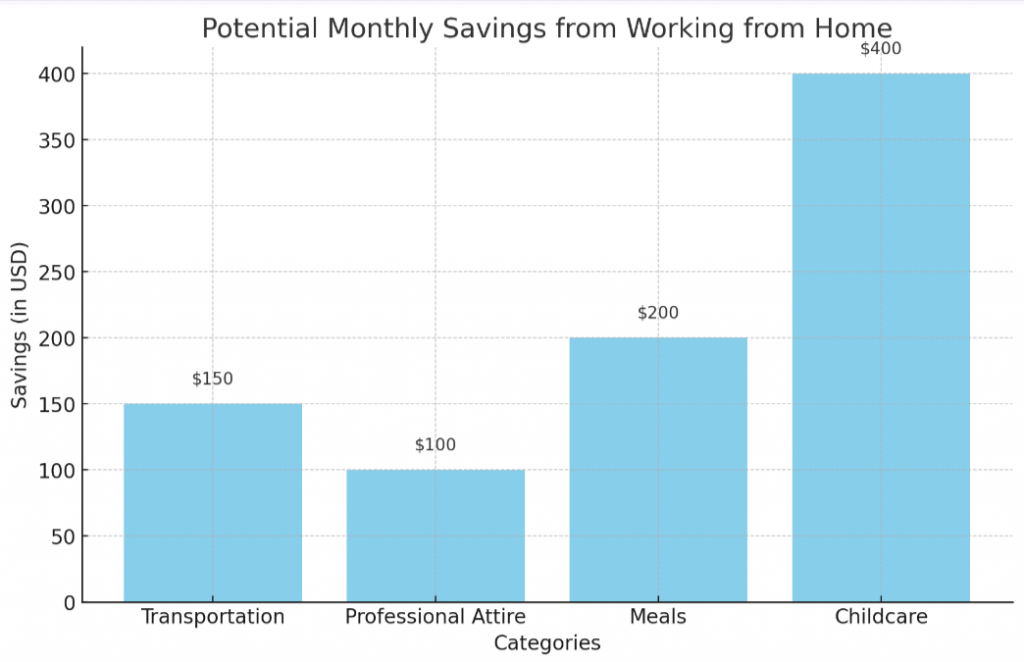Pros and Cons of Working From Home in Social Media Jobs
With more industries offering remote work, you may be contemplating a career shift in social media jobs. Did you know that as per the U.S. Bureau of Labor Statistics, over 24% of employees worked from home in some capacity during the pandemic?
In this blog post, we provide an objective evaluation of what working from home truly involves for social media specialists; covering both perks like flexibility and independence as well as potential downsides such as isolation.
Intrigued by the prospect of ditching your daily commute? Keep reading!
Key Takeaways
- Working from home in social media jobs offers increased independence and autonomy, allowing employees to manage their tasks and make decisions without constant supervision.
- Remote work eliminates commuting hassles, reducing stress and saving valuable time that can be better utilized for job tasks or spent with family.
- Employees who work from home in social media jobs have the opportunity to save on expenses such as transportation costs, professional attire, meals, and childcare.
Understanding Work-from-Home Jobs in Social Media
Work-from-home jobs in social media include positions like content creators, community managers, digital marketers and strategists. These roles demand an understanding of various platforms and the ability to use them effectively for communication, branding and advertising purposes.
As these jobs are primarily online-based, remote workers need a stable internet connection to fulfill their tasks from home.
This telecommuting trend is expanding rapidly with advancements in technology. This allows skilled professionals to work remotely while collaborating with colleagues across different locations via virtual meetings.
The elimination of daily commutes not only saves time but also reduces transportation expenses significantly. Moreover, working within flexible schedules can lead many employees to feel more productive as they create their ideal work-life balance avoiding office distractions that often break concentration during office hours.
Benefits of Working from Home in Social Media Jobs
Working from home in social media jobs offers increased independence, no commuting hassles, savings on expenses, enhanced productivity, development of technical and communication skills, flexibility in work, reduced office distractions, opportunities for collaboration across different locations, and the creation of professional networks.
Increased Independence
Working from home in social media jobs boosts your independence. You have the autonomy to manage your tasks and make important decisions without constant supervision. This freedom empowers you to develop problem-solving skills and fosters creativity, making you a valuable asset to your team.
Your increased independence also pushes you to be more self-motivated. Without an office setting’s inherent structure, telecommuting propels you towards developing robust self-discipline and time-management tactics.
Utilizing effective strategies like batching work or adopting Pomodoro technique can lead to higher productivity levels.
No Commuting Hassles
Working from home in social media jobs frees employees from the shackles of daily commuting. This benefit often results in less stress and promotes a more positive start to the workday.
Trading rush-hour traffic for a leisurely walk down the hall saves valuable time that can be better utilized on job tasks or spent with family. The absence of commute means fewer chances of motor accidents, adding another layer to personal safety.
Moreover, it drastically reduces transportation costs and expenses such as gasoline or public transport fares, parking fees, car maintenance – leading to impressive financial savings over time.
As an added bonus, telecommuting contributes to lowering carbon emissions which is beneficial for our environment. Thus making remote work in social media not just convenient but also environmentally responsible.
Savings on Expenses
Working from a home office notably decreases various costs associated with traditional office work. The most palpable savings come in the form of transport-related expenses, as employees no longer need to shoulder fuel or public transport costs for daily commutes.
Additionally, lower expenditures on professional attire becomes evident as remote employees often don’t have to invest in costly business clothes. Mealtime also sees financial benefits since home-cooked food typically ends up cheaper than meals bought outside the house or even at an office canteen.
Notably, parents may experience reduced childcare costs due to their presence at home during working hours – offering further significant savings potential. Overall, this reduced cost burden contributes significantly towards making remote roles financially appealing for many employees engaged in social media jobs.

Enhanced Productivity
Remote work in social media can lead to enhanced productivity for several reasons. Firstly, working from home provides a quieter and more focused environment compared to a bustling office setting.
Without constant interruptions and distractions, remote workers can concentrate better on their tasks, leading to increased efficiency. Additionally, studies have shown that many remote workers in the social media industry reported higher levels of productivity compared to when they were working in an office setting.
This boost in productivity can be attributed to the flexibility and independence that comes with remote work, allowing individuals to structure their workday according to their peak performance times.
Development of Technical and Communication Skills
Employees in social media jobs who work from home have the opportunity to develop and improve their technical skills. Through the use of online meeting, communication, and collaboration platforms, remote workers can stay connected with colleagues and build their proficiency in using these technologies.
Additionally, working remotely requires effective communication skills for virtual interactions with team members. This encourages employees to refine their ability to convey ideas clearly and collaborate effectively in a digital environment.
By embracing remote work, individuals in social media jobs can enhance both their technical expertise and their communication abilities.
Flexibility in Work
Working from home in social media jobs offers a high level of flexibility in work. Employees have the freedom to set their own schedules and work at their own pace, allowing them to design a workflow that best suits their productivity levels.
This means they can choose when they want to start and finish their workday, taking into account personal commitments or other responsibilities they may have. The flexibility extends beyond just hours as remote workers also have more control over where they work from.
As long as there is a reliable internet connection, employees can work from anywhere – whether it’s at home, a coffee shop, or while traveling. This gives them the ability to create an environment that stimulates creativity and enhances focus, ultimately contributing to increased job satisfaction and overall well-being.
Reduced Office Distractions
Working from home offers the advantage of reduced office distractions, allowing employees to focus more effectively on their job tasks. Without the noise and interruptions commonly found in a traditional office setting, remote workers can concentrate better and accomplish their work more efficiently.
This improved concentration leads to increased productivity and higher-quality output. With fewer distractions, employees have the opportunity to delve deeper into their work and produce results that meet or exceed expectations.
By eliminating unnecessary disruptions, working from home enables individuals to create an environment conducive to optimal performance.
Opportunities for Collaboration Across Different Locations
Working from home in social media jobs offers exciting opportunities for collaboration across different locations. Remote work allows employees to connect and collaborate with colleagues who may be located in diverse geographical areas.
This opens up doors for business development and learning from industry professionals in various office settings. By working remotely, individuals can tap into a broader network of expertise and experiences, gaining valuable insights that can contribute to their professional growth.
Whether it’s brainstorming ideas, sharing feedback, or collaborating on projects, telecommuting enables seamless collaboration across different locations, fostering innovation and creativity within the social media industry.
Creation of Professional Networks
Working from home in social media jobs allows employees to actively create and expand their professional networks. With remote work, individuals can build connections with colleagues and managers through online networking platforms, eliminating the need for in-person events.
The internet connection required for telecommuting opens up opportunities for virtual networking, fostering collaborations across different locations. This flexible approach to building professional relationships also enhances technical skills necessary for maintaining these networks effectively.
Remote work not only provides independence but also enables individuals to establish and strengthen their professional connections in the digital landscape of social media jobs.
Drawbacks of Working from Home in Social Media Jobs
Working from home in social media jobs can have its challenges, including the risk of increased isolation and distractions at home. Read on to learn more about these drawbacks and how they can impact your remote work experience.
Risk of Increased Isolation
Working from home in social media jobs can come with the risk of increased isolation. When you are not physically present in an office environment, it can be challenging to connect and interact with colleagues on a regular basis.
This lack of face-to-face interaction may lead to feelings of loneliness and detachment from the workplace. Additionally, remote workers may experience a disconnect between themselves and their physical workplace, potentially impacting their sense of belonging and camaraderie with co-workers.
It is important for individuals working remotely to find ways to stay connected through virtual meetings, online communication platforms, and maintaining regular contact with colleagues to mitigate the risk of increased isolation.
Costs Associated with Setting Up a Home Office
Setting up a home office can come with certain expenses. However, these costs are often outweighed by the savings and benefits of working from home. One major cost that can be eliminated is transportation expenses, which can amount to as much as $5,000 per year for Americans commuting to their workplaces.
In addition, setting up a home office allows for savings on work clothing, meals, and childcare. Remote employees, freelancers, and self-employed individuals may also be eligible for tax breaks such as a home office deduction or equipment depreciation.
Furthermore, the benefit of creating a quiet and focused work environment in your own space can lead to increased productivity over time. Overall, while there may be some initial costs involved in setting up a home office, the long-term financial savings and improved work environment make it a worthwhile investment.
Potential for Overworking
Working from home in social media jobs can offer many advantages, but it also comes with the potential for overworking. The flexibility and convenience of remote work can blur the boundaries between professional and personal life, leading to longer work hours.
This temptation to put in extra hours is a common challenge faced by remote workers. Constant connectivity and monitoring in social media jobs can contribute to this issue as well.
Unfortunately, overworking can lead to burnout, decreased motivation, and negatively impact work-life balance. It is important for individuals working from home to establish clear boundaries and prioritize self-care to avoid falling into the trap of overworking.
Constant connectivity allows us almost unlimited access to our work tasks at any time of day or night. However, this ease of accessibility often results in individuals feeling compelled or pressured to be constantly available and engaged with their work even outside traditional office hours.
As a result, many remote workers find themselves checking emails late into the evening or taking on additional projects during weekends. This constant availability blurs the lines between personal time and professional responsibilities, making it easier for individuals to fall into unhealthy patterns of overwork.
Overworking not only harms overall well-being but also reduces productivity due to exhaustion and heightened levels of stress. Consequently, establishing boundaries becomes crucial when working remotely – setting specific working hours helps create structure within one’s routine while giving ample opportunity for rest and recovery after dedicated periods of focused activity.
Possible Reduction in Productivity
Remote work can present challenges when it comes to maintaining productivity. One common issue is the possible reduction in productivity that individuals may experience. Lack of social interaction and in-person connections with colleagues can contribute to this decrease in productivity.
Additionally, overworking and burnout are common challenges faced by remote workers, which can further impact their ability to stay productive. Distractions from household responsibilities, caring for children or pets, and other home-related tasks can also hinder productivity while working remotely.
It’s important for individuals to be aware of these potential challenges and find strategies to mitigate them in order to maintain high levels of productivity while working from home.
Distractions at Home
Distractions at home can significantly affect work productivity for individuals in social media jobs. These distractions can lead to decreased efficiency, missed deadlines, and lower quality work.
Without the structure of a traditional office environment, it’s easy to get sidetracked by household chores or personal tasks. Family members or pets may interrupt work productivity and become distractions as well.
Additionally, the availability of personal devices and social media platforms at home can divert attention from work tasks. Engaging in personal use of social media during work hours can decrease overall job performance.
Risk of Workplace Disconnect
Remote work in social media jobs comes with the risk of workplace disconnect. Telecommuting can lead to a lack of connection between remote workers and their physical workplace. Without in-person contact, there may be a decrease in social interaction and camaraderie among colleagues.
Additionally, spending most of the time working independently at home can increase feelings of isolation. Electronic communication may also result in misinterpretation of cues and tone, further contributing to this disconnect.
Distractions at home can also impact productivity levels for remote workers.
Difficulty in Maintaining Work-life Balance
Maintaining work-life balance can be challenging when working from home in social media jobs. Without the physical separation of a traditional office, it becomes easier for work to spill into personal time and vice versa.
This can lead to longer working hours, increased stress, and an overall blurring of boundaries between professional and personal life. It requires discipline and conscious effort to establish clear work schedules, set boundaries between work and leisure, and prioritize self-care to find a healthy balance in this remote work setup.
Reduced Face-to-Face Interaction
Working from home in social media jobs often means less face-to-face interaction with colleagues and managers. This can be a drawback for some individuals who thrive on personal connections and collaboration.
Without the opportunity to have in-person discussions, brainstorming sessions, or social interactions at the office, remote workers may miss out on building strong professional relationships and networks.
Additionally, reduced face-to-face interaction can hinder effective communication and make it harder to convey complex ideas or feedback. It’s important for remote workers to find alternative ways to stay connected and engaged with their team members through online platforms and virtual meetings.
Conclusion
In conclusion, working from home in social media jobs has both advantages and disadvantages. It offers increased independence, savings on expenses, and opportunities for collaboration across different locations.
However, it also carries the risk of isolation, potential overwork, and difficulties in maintaining work-life balance. Ultimately, individuals considering remote work should carefully weigh these pros and cons to determine if it aligns with their needs and preferences.

